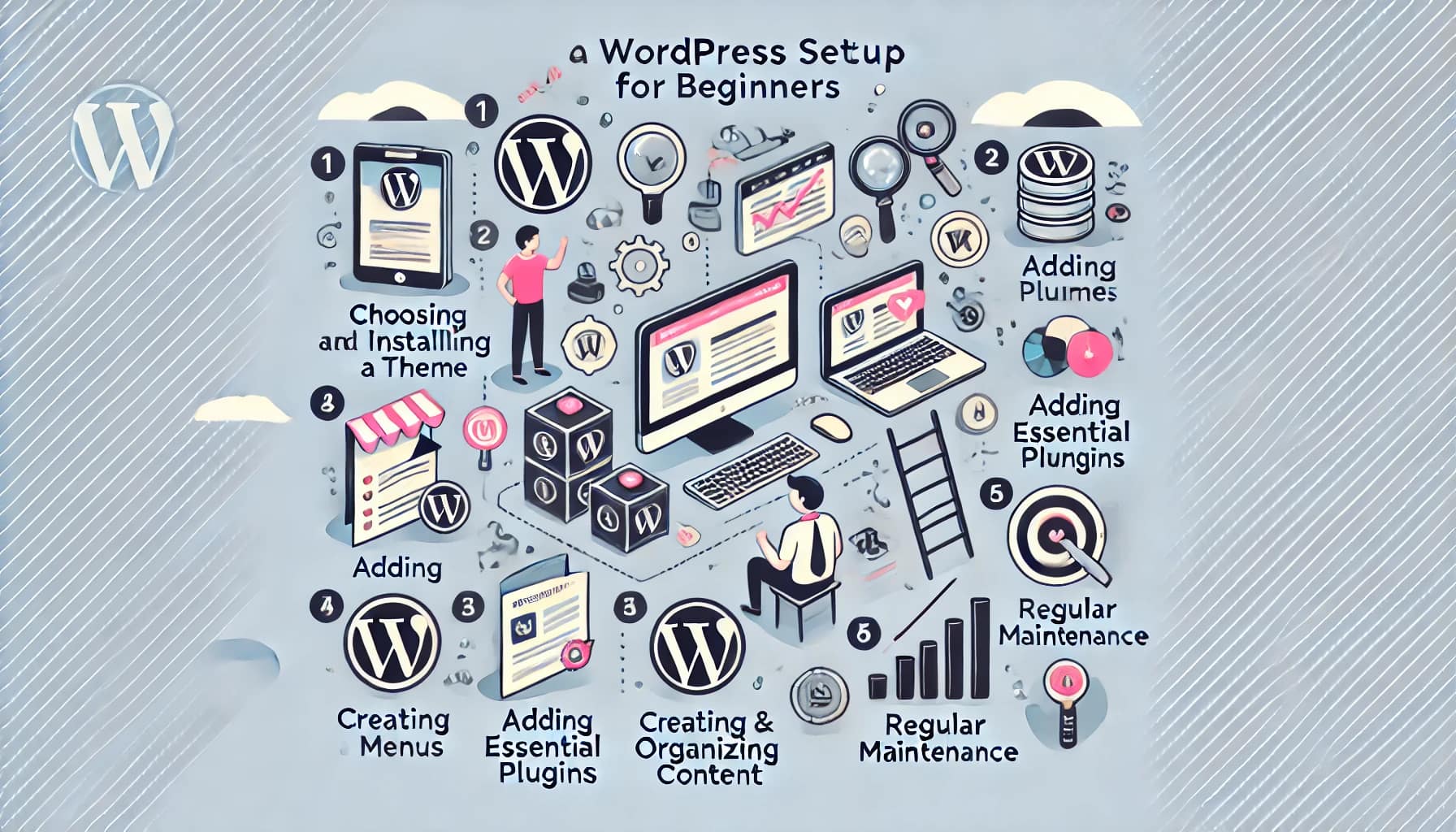
Open-source software
Open-source refers to a type of software development and distribution model in which the source code for a piece of software is made publicly available for anyone to view, use, modify, and distribute. This means that the software’s users have the ability to study, change, and distribute the code, either as it is or with modifications.
Open-source software is typically developed in a collaborative, community-driven way, with multiple contributors working together to improve and refine the software over time. This approach can lead to higher-quality software that is more secure, reliable, and customizable than closed-source software that is developed and controlled by a single company or individual.
Some well-known examples of open-source software include the Linux operating system, the Apache web server, the WordPress content management system, and the Python programming language.
The WordPress content management system
WordPress is an open-source content management system (CMS) that allows users to create and manage websites, blogs, and online stores. It was initially released in 2003 as a blogging platform, but over the years, it has evolved into a robust CMS that powers over 40% of all websites on the internet.
One of the main advantages of WordPress is its ease of use. Even users without technical knowledge can create and publish content on their WordPress site with ease. The platform offers a wide range of themes and plugins that can be installed to customize the appearance and functionality of a site.
WordPress is also highly customizable, with thousands of free and paid themes and plugins available in its official directory, as well as many third-party resources. This means that users can create highly customized websites that meet their specific needs.
Another advantage of WordPress is its strong community support. As an open-source project, it has a large community of developers who contribute to its development and provide support through forums, documentation, and other resources.
In addition, WordPress is highly scalable, meaning it can handle websites of any size, from small personal blogs to large e-commerce sites. Its codebase is also constantly updated and improved for security and performance, making it a reliable and secure platform for website management.
WordPress is a versatile and powerful content management system that can be used for a wide range of website and online store applications.
Examples of open-source themes for WordPress
There are many open-source themes available for WordPress that are free to use, modify, and distribute.
Here are a few examples:
Astra
Astra is a lightweight and customizable theme that is popular among WordPress users. It offers a range of pre-designed templates that can be imported with a single click and customized to fit any brand or design style.
OceanWP
OceanWP is another lightweight and highly customizable theme that is designed to work well with page builders like Elementor and Beaver Builder. It includes a range of pre-built demos and templates that can be imported and customized to fit any need.
Hestia
Hestia is a modern and stylish theme that is suitable for a wide range of businesses and organizations. It includes a range of customization options, including header and footer layouts, color schemes, and font choices.
Ashe
Ashe is a simple and clean theme that is ideal for bloggers and content creators. It includes a range of layout options, including a grid layout and a full-width layout, and is highly customizable with a range of color and font options.
Zillah
Zillah is a minimalist theme that is perfect for bloggers and writers. It includes a range of post formats, including video and audio posts, and is highly customizable with a range of color and font options.
These are just a few examples of the many open-source themes available for WordPress. Users can browse the WordPress theme directory or search for third-party themes to find the perfect theme for their needs.
Table outlining some of the pros and cons of using open-source themes in WordPress
| Pros | Cons |
| Free to use, modify, and distribute | May have limited support |
| Wide range of customization options | May have compatibility issues with plugins or other themes |
| Often created by a community of developers, meaning the code is regularly updated and improved | May not be as polished or professional-looking as premium themes |
| Can be highly customizable to fit specific needs | May require some technical knowledge to set up and customize |
| Can be used to create unique, personalized websites without the need for extensive coding knowledge | May not include all the features or functionality of a premium theme |
Open-source themes can be a great option for users who want to create a customized website on a budget or who have some technical knowledge and want more control over their website's design and functionality. However, they may not be the best option for users who require extensive support or who need a polished, professional-looking website without the need for customization.
Examples of open-source plugins for wordpress
There are thousands of open-source plugins available for WordPress, covering a wide range of functionality.
Here are a few examples:
Yoast SEO
Yoast SEO is a popular plugin that helps optimize websites for search engines. It includes features like on-page analysis, XML sitemap creation, and meta tag management.
Jetpack
Jetpack is a powerful plugin that includes a range of features like site stats, social media sharing, and security scans. It can also be used to back up and restore a website.
WooCommerce
WooCommerce is a popular e-commerce plugin that allows users to create and manage an online store. It includes features like product management, payment gateway integration, and shipping options.
Contact Form 7
Contact Form 7 is a simple and lightweight plugin that allows users to create and manage contact forms. It includes support for multiple contact forms and customization options for form fields and messages.
WPForms Lite
WPForms Lite is another contact form plugin that is easy to use and customize. It includes pre-built templates and drag-and-drop form builders, making it simple to create complex forms.
W3 Total Cache
W3 Total Cache is a plugin that helps improve website performance by caching pages and reducing load times. It includes a range of optimization features like minification and browser caching.
These are just a few examples of the many open-source plugins available for WordPress. Users can browse the WordPress plugin directory or search for third-party plugins to find the perfect plugin for their needs.
Table outlining some of the pros and cons of using open-source plugins in WordPress:
| Pros | Cons |
| Often free to use, modify, and distribute | May have limited support or documentation |
| Wide range of functionality available | May have compatibility issues with other plugins or themes |
| Often created by a community of developers, meaning the code is regularly updated and improved | May not be as polished or user-friendly as premium plugins |
| Can be highly customizable to fit specific needs | May require some technical knowledge to set up and configure |
| Can be used to add new features and functionality to a website without the need for extensive coding knowledge | May not include all the features or functionality of a premium plugin |
Open-source plugins can be a great option for users who want to add new functionality to their website without breaking the bank or who have some technical knowledge and want more control over their website's functionality. However, they may not be the best option for users who require extensive support or who need a polished, user-friendly website without the need for customization.
What is premium
Premium typically refers to something that is of high quality and often comes with a price or cost attached. In the context of software, premium refers to software products or services that are typically sold for a higher price than their free or open-source counterparts.
For example, premium WordPress themes and plugins are typically sold for a higher price than their open-source counterparts, and often come with additional features, support, and customization options. Premium software may also include additional services such as customer support, updates, and maintenance.
While premium software may come with additional costs, it often includes benefits such as enhanced functionality, better security and support, and more polished and professional-looking designs. Users who require advanced features or customization options, or who need extensive support and documentation, may find that premium software is a worthwhile investment.
It's worth noting that premium software is not always better than free or open-source software, and the decision to use premium or open-source software should be based on a user's individual needs and budget.
Thank you for reading and sharing!
Source OpenAI’s ChatGPT Language Model and DALLE – Images Picsart

Invest in your future & learn
Learn affiliate marketing & build your own website with an awesome community and join me there. You can be a free starter for as long as needed. It includes free hosting and basic teachings. If you are an advanced user, you may like to level up. Just have a look, and see for yourself!






